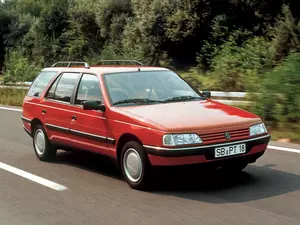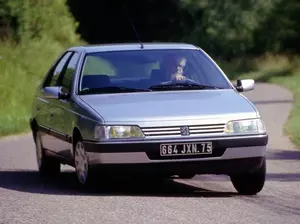
| Vehicle | Curb weight | Difference from world's smallest | Weight to power ratio | 0—60 mph acceleration ratio | Consumption ratio |
|---|---|---|---|---|---|
| 1.8 |
1100 kg / 2426 lbs |
675 kg (1489 lbs) heavier | 11 kg to 1 hp | - |
147 kg/L (324 lbs/L) |
| 1.9 D |
1135 kg / 2503 lbs |
710 kg (1566 lbs) heavier | 17 kg to 1 hp | 65 kg/s (143 lbs/s) |
180 kg/L (397 lbs/L) |
| 2.0 |
1135 kg / 2503 lbs |
710 kg (1566 lbs) heavier | 9 kg to 1 hp | 106 kg/s (234 lbs/s) | - |
| 2.0 16V |
1180 kg / 2602 lbs |
755 kg (1665 lbs) heavier | 8 kg to 1 hp | 127 kg/s (280 lbs/s) |
128 kg/L (282 lbs/L) |
| 1.9 TD |
1150 kg / 2536 lbs |
725 kg (1599 lbs) heavier | 13 kg to 1 hp | 95 kg/s (209 lbs/s) |
160 kg/L (353 lbs/L) |
| 2.0 T 16 X4 |
1340 kg / 2955 lbs |
915 kg (2018 lbs) heavier | 7 kg to 1 hp | 200 kg/s (441 lbs/s) |
143 kg/L (315 lbs/L) |
| Vehicle | 1.8 |
|---|---|
| Curb weight |
1100 kg / 2426 lbs |
| Difference from world's smallest | 675 kg (675 lbs) heavier |
| Weight to power ratio | 11 kg to 1 hp |
| 0—60 mph acceleration ratio | - |
| Consumption ratio |
147 kg/L (324 lbs/L) |
| Vehicle | 1.9 D |
| Curb weight |
1135 kg / 2503 lbs |
| Difference from world's smallest | 710 kg (710 lbs) heavier |
| Weight to power ratio | 17 kg to 1 hp |
| 0—60 mph acceleration ratio | 65 kg/s (143 lbs/s) |
| Consumption ratio |
180 kg/L (397 lbs/L) |
| Vehicle | 2.0 |
| Curb weight |
1135 kg / 2503 lbs |
| Difference from world's smallest | 710 kg (710 lbs) heavier |
| Weight to power ratio | 9 kg to 1 hp |
| 0—60 mph acceleration ratio | 106 kg/s (234 lbs/s) |
| Consumption ratio | - |
| Vehicle | 2.0 16V |
| Curb weight |
1180 kg / 2602 lbs |
| Difference from world's smallest | 755 kg (755 lbs) heavier |
| Weight to power ratio | 8 kg to 1 hp |
| 0—60 mph acceleration ratio | 127 kg/s (280 lbs/s) |
| Consumption ratio |
128 kg/L (282 lbs/L) |
| Vehicle | 1.9 TD |
| Curb weight |
1150 kg / 2536 lbs |
| Difference from world's smallest | 725 kg (725 lbs) heavier |
| Weight to power ratio | 13 kg to 1 hp |
| 0—60 mph acceleration ratio | 95 kg/s (209 lbs/s) |
| Consumption ratio |
160 kg/L (353 lbs/L) |
| Vehicle | 2.0 T 16 X4 |
| Curb weight |
1340 kg / 2955 lbs |
| Difference from world's smallest | 915 kg (915 lbs) heavier |
| Weight to power ratio | 7 kg to 1 hp |
| 0—60 mph acceleration ratio | 200 kg/s (441 lbs/s) |
| Consumption ratio |
143 kg/L (315 lbs/L) |

| Vehicle | Curb weight | Difference from world's smallest | Weight to power ratio | 0—60 mph acceleration ratio | Consumption ratio |
|---|---|---|---|---|---|
| 1.6 |
1090 kg / 2403 lbs |
665 kg (1466 lbs) heavier | 12 kg to 1 hp | 81 kg/s (179 lbs/s) |
147 kg/L (324 lbs/L) |
| Vehicle | 1.6 |
|---|---|
| Curb weight |
1090 kg / 2403 lbs |
| Difference from world's smallest | 665 kg (665 lbs) heavier |
| Weight to power ratio | 12 kg to 1 hp |
| 0—60 mph acceleration ratio | 81 kg/s (179 lbs/s) |
| Consumption ratio |
147 kg/L (324 lbs/L) |

| Vehicle | Curb weight | Difference from world's smallest | Weight to power ratio | 0—60 mph acceleration ratio | Consumption ratio |
|---|---|---|---|---|---|
| 1.9 Sport MI-16 |
1110 kg / 2448 lbs |
685 kg (1511 lbs) heavier | 7 kg to 1 hp | 135 kg/s (298 lbs/s) | - |
| Vehicle | 1.9 Sport MI-16 |
|---|---|
| Curb weight |
1110 kg / 2448 lbs |
| Difference from world's smallest | 685 kg (685 lbs) heavier |
| Weight to power ratio | 7 kg to 1 hp |
| 0—60 mph acceleration ratio | 135 kg/s (298 lbs/s) |
| Consumption ratio | - |